'A change in school culture': A year after speaking out, Concord HS GSA continues advocacy

The thought of crossing the stage for graduation often brought Emory Gloner to tears. The then-junior feared how the day would unfold, including his safety as a transgender man.
Used to “getting hate” and having people stare at him or talk about him for his gender identity, Gloner had worried something would ruin any happiness of completing a major life milestone.
One year later, facing a fast-approaching commencement ceremony in June, the 18-year-old Concord High School senior now excitedly awaits the celebration.
“I couldn’t look forward to it. It was more anxiety. ... Anytime I thought about it, I just wanted to, like, cry ‘cause I didn’t think about it in a positive way, but now that that’s changed." he said. "I’m looking forward to it a lot.”
So, what changed within the past year to drastically impact Gloner’s outlook on graduation? Not everything that some students wanted, namely adopting a single graduation gown color to neutralize gender association. But, speaking out led students down the rabbit hole of other cultural changes, efforts that are seeing success.
Issues faced by LGBTQ+ students
Gender nonconforming students who typically identify as nonbinary, genderqueer or genderfluid do not identify with any gender and subsequently do not use terms like boy/man or girl/woman to describe themselves.
Although the Brandywine School District permits students to choose between two graduation gown colors, this doesn’t eliminate the gendered labels already upon the colors, creating an uncomfortable environment in which nonbinary students say they feel excluded.
It also does little to quell the bullying and gender dysphoria (a sense of unease a person may feel due to a mismatch between their biological sex and their gender identity) experienced by trans and gender-nonconforming students. Announcing graduates in an alternating male/female pattern at commencement further alienates and ostracizes the population of students who do not fit these labels.
These conditions have led to students outing themselves, feeling unsafe and facing harassment from peers and parents, advocates of one gown color said.
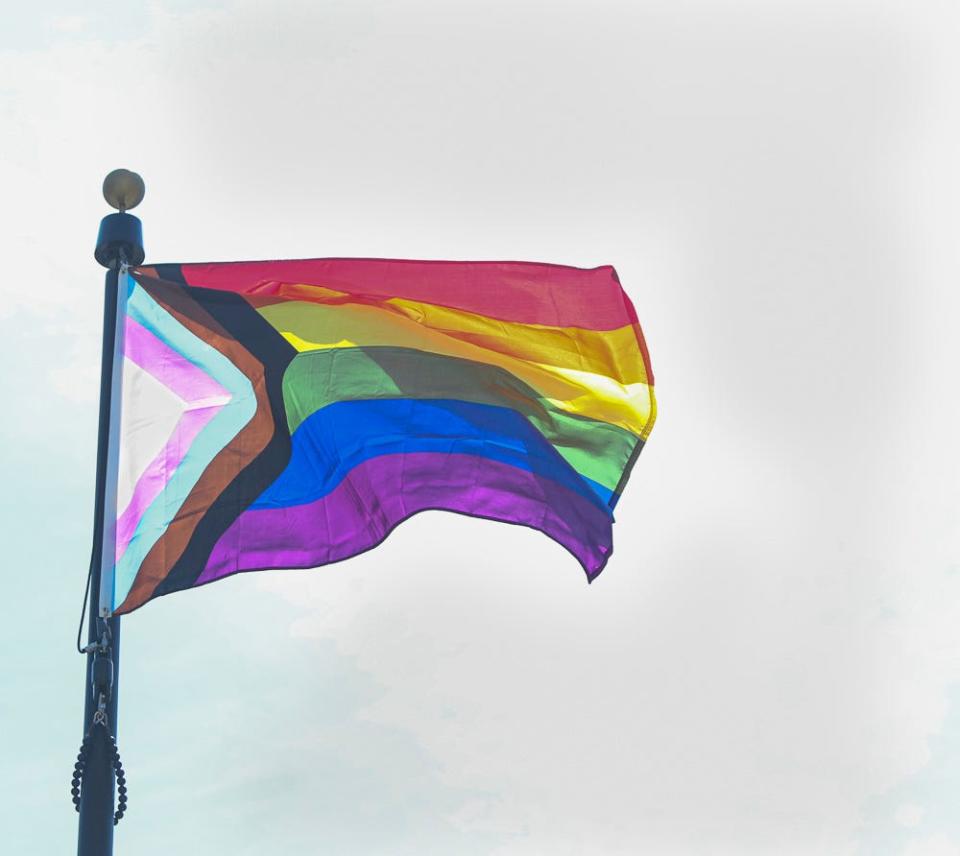
Students in Concord’s Gay Straight Alliance, also referred to as GSA, along with other LGBTQ+ students, have fought for their safety and visibility, and advocated for less binary graduation ceremonies, for more than a decade, but some remediation came only in recent years.
In 2018, Concord students went to school administration to share their grievances about a school policy that forced students to wear gown colors based on gender. The school then changed its policy to allow students to choose which gown color they wanted but told students any other changes would need to be addressed by district administration.
The GSA continued to push for one gown, reaching out to the Brandywine School District school board multiple times between 2019 and 2021, but was met with silence. The two groups met in June of 2022, where the GSA was told that if each of the three district high schools — Concord, Mount Pleasant and Brandywine — could all vote in favor of one gown color, it would be allowed. The vote was not unanimous.
In 2023, still with no solution and one day left before graduation gown order forms were due in January, the GSA created the Choose Maroon campaign, spreading the word about the issue and asking the class of 2023 to unite and all “choose maroon” for graduation.
Too little time was left, and the effort was unsuccessful, but Choose Maroon was just the beginning.
Original reporting: LGBTQ students fight for inclusion: 'We don't need to keep experiencing these 'hardships'
Concord High School’s 2023 commencement
In recent years, Concord High School lined students up by gown color during graduation, an alternating male/female pattern.
In 2023, the school’s commencement ceremony lined graduates up alphabetically, a small but impactful step forward for the GSA and queer students among the student body, although formal communication to the GSA or otherwise about the alteration has yet to be made, said English teacher Joseph Consiglio, who has been the GSA adviser for seven years and at Concord for 24.
“It just made it more of a private thing than a question of ‘what side will you line up on?’” said Consiglio, who calls last year’s ceremony a “much better event” than in years past. “’Cause when you lined up by color, it was like, OK, you have to choose sides, and the sides are by gender, so you have to tell everybody you’re this, you’re that, you know? So now you can say, ‘I just like this this color.”
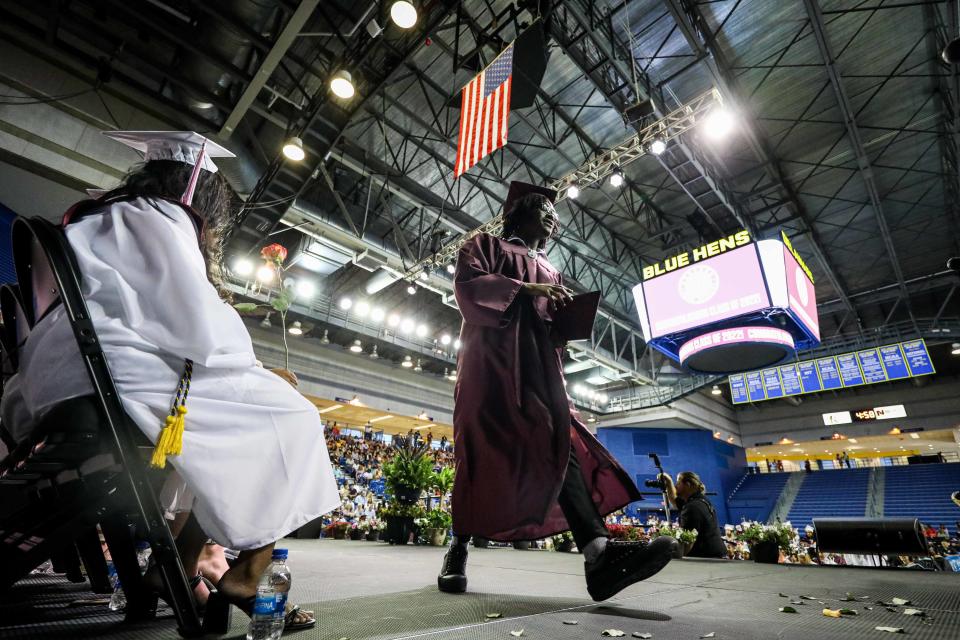
Gloner, who attended the ceremony to celebrate his sister, also noticed that the practice of handing women students flowers at graduation, which dates back to the school’s founding in 1969, didn’t happen, he said.
Although the lack of communication about the ceremony change feels like a slight given the GSA’s long and continuing fight for visibility, it takes a weight off Consiglio’s shoulders now that he doesn’t have to “be in a defensive posture” or “constantly look around” to make sure the students he looks out for are safe. He also has noticed less anxiety from students about graduation, he said.
“I just want to give hugs,” he said. “I just want to celebrate what they’ve done, so for me personally, it becomes just a relief to think they’re gonna just get to enjoy the day.”
After the GSA asked the district last May to change the language on the graduation gown order forms from Jostens, a memorabilia manufacturer, the school board agreed with the club’s findings that, out of the three district high schools, Concord’s order form was the only one asking students to choose “male” or “female.” The options are now “maroon” or “white.”
According to Consiglio, this change should alleviate tension between graduates and families who disagree with their child’s gender identity and prevent them from choosing the gown they wish to wear. This year, he heard students discuss wearing the gown they prefer, regardless of what the gendered undertones of the color are.

But it still doesn’t completely take away the gender issues present. Instead, “it just puts it into the background instead of the foreground,” Consiglio said.
Looking ahead, the GSA still wants one gown to be adopted by the district to make graduation as inclusive and safe as possible.
“So far, that’s out of our hands, because when we tried that last year, the district said that all three high school have to agree in unison that there’s only one color graduation gown,” said Gloner, current president of Concord’s GSA. “So, because of that, we couldn’t go one color and that’s kind of where our hands are tied.”
When contacted by Delaware Online/The News Journal for comments about recent or upcoming changes to graduation ceremonies, Kenneth Rivera, assistant superintendent of the Brandywine School District, said in an email, “The three high schools have not informed me of any changes to the graduation program. I anticipate that they will run very similarly to last year.”
Changing school culture
The Choose Maroon campaign still proved fruitful.
Gloner sees a more accepting student environment. Peers seem more content and want to understand one another, and he hasn’t had any issues with classmates misgendering him this year.
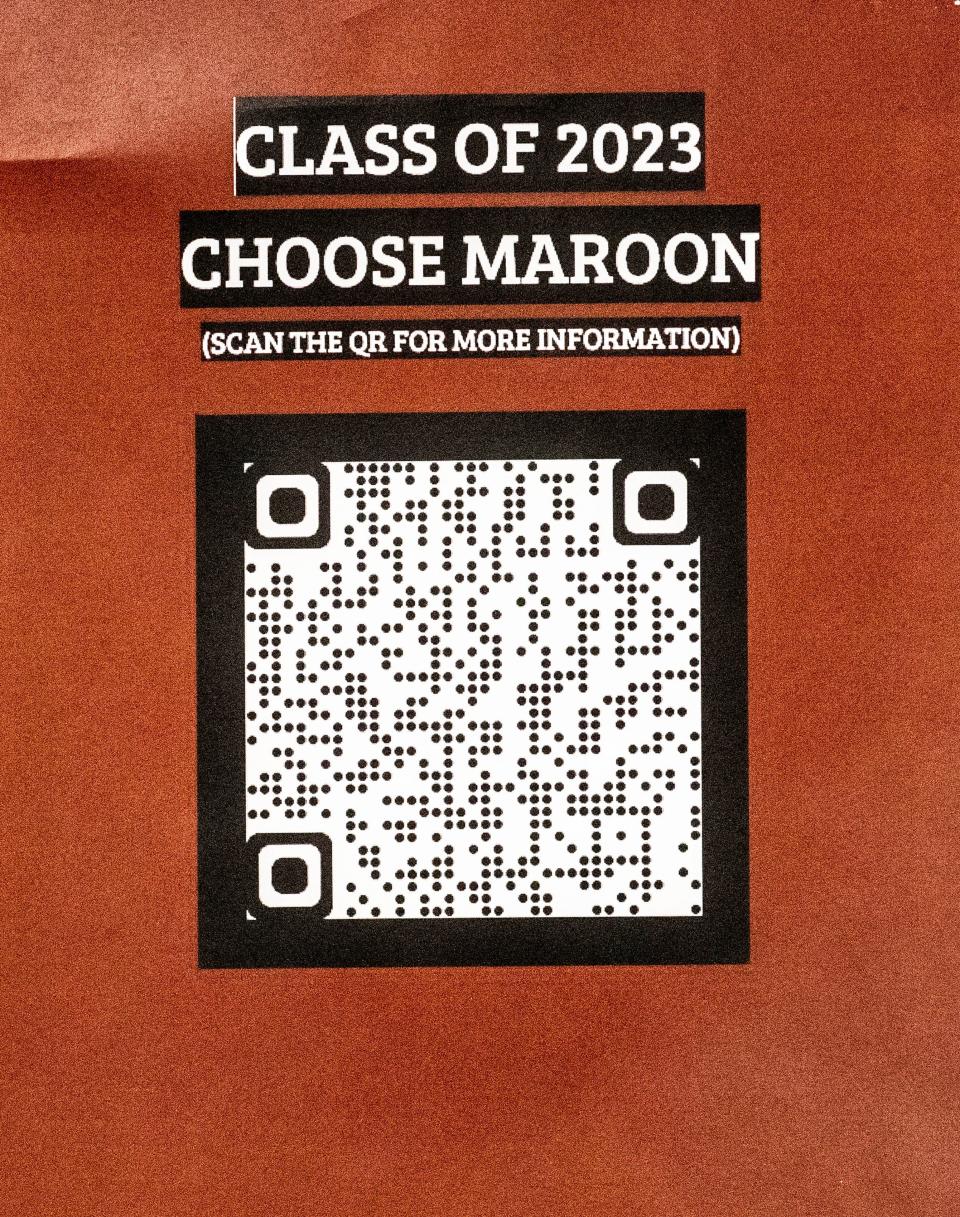
Gloner adds that teachers continue to show support for the GSA after they went public with their concerns and that having open discussions with school staff about LGBTQ+ issues and inclusivity has led to impactful changes like asking students to share their pronouns and preferred names on the first day of classes.
To raise awareness, Concord’s new principal, Kevin Palladinetti, even delivered a weeklong morning announcement about Nex Benedict – a nonbinary Oklahoma high school student who was bullied for their identity and died of suicide, the day after a physical altercation in the girls’ bathroom with peers, Gloner said.

Vivian Hevalow, 17, a junior at Concord and a member of the GSA, describes Concord as a place where students can celebrate their differences and staff are accepting and supportive, a “shocking” contrast to the school board. Both Hevalow and Gloner say the GSA hasn’t had much contact with the district board due to its previous reactions to issues broached by the student group. Instead, the club addresses school administrators or other officials who can help with their requests.
From his side of the desk, Consiglio has also cataloged the GSA’s impact.
“I think we affected a change in school culture. I think that there’s a greater level of tolerance,” he said. “It got a lot of attention. There’s a lot of talk about what it meant, and how it felt and why it was important, and I think that the relative peace and calm of last year’s graduation may have been a product of that.”
Concord GSA continues fighting for change, inclusivity
The GSA has since put the Choose Maroon campaign on the back burner and set their sights on other issues.
Earlier this year, the GSA worked with the school’s Make a Change club, a gathering of Concord’s minority student clubs, to attempt to change school rules about only wearing academic stoles at graduation. Although the school held firm, Gloner cites the experience as a collaborative effort that saw a diverse group of students fighting for the same cause.
One of the issues at Concord still plaguing other LGBTQ+ students is the lack of gender-neutral bathrooms.

Some queer students don’t feel safe using the restrooms designated for men or women, often asking a friend to tag along or opting to use the private bathroom in the nurse’s office. With the latter being the popular option, Gloner said the line is long and has made him late for class.
Still, it’s better than risking the men’s room, where he and a friend once had pictures taken of them without their consent and a peer telling other classmates that there were “two girls in the bathroom,” he previously told Delaware Online/The News Journal.
During the winter, the Brandywine School District addressed a now-passed referendum that would provide repairs and maintenance, support programming and curriculum and otherwise improve education spaces in the district. With gender-neutral bathrooms on the GSA’s radar, a costly endeavor, club members rallied support for the referendum to push their agenda forward.
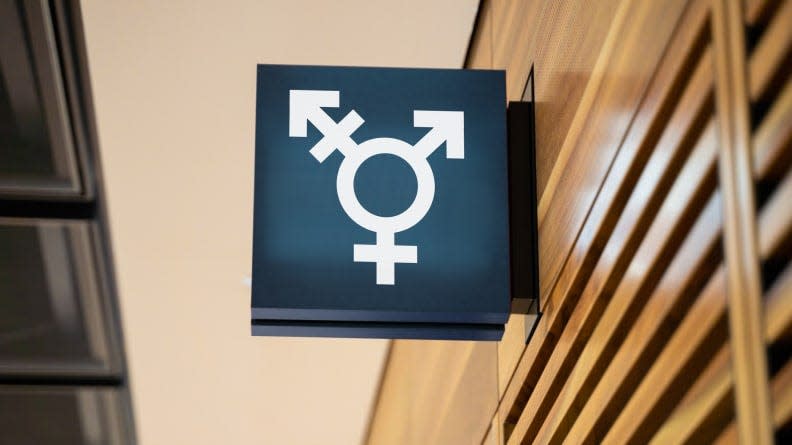
This was the most the club has communicated with the district this year, and not enough time has passed to tell if the responsiveness from the district is a permanent change, Consiglio said. The club eventually met with a district facilities manager and proposed short-term and long-term plans for adding gender-neutral bathrooms to the school and workshopped their ideas.
In the meantime, students are meeting with their principal to brainstorm gaining supervised access to a private, unused bathroom in the school, a temporary gender-neutral bathroom until official renovations can be made.
“They were giving us real numbers, so the kids were also able to see that they have been heard. There is a plan in place. The obstacles are not attitude, it’s financial and logistical, but there’s commitment to addressing them,” Consiglio said.
‘A tremendous sense of empowerment’
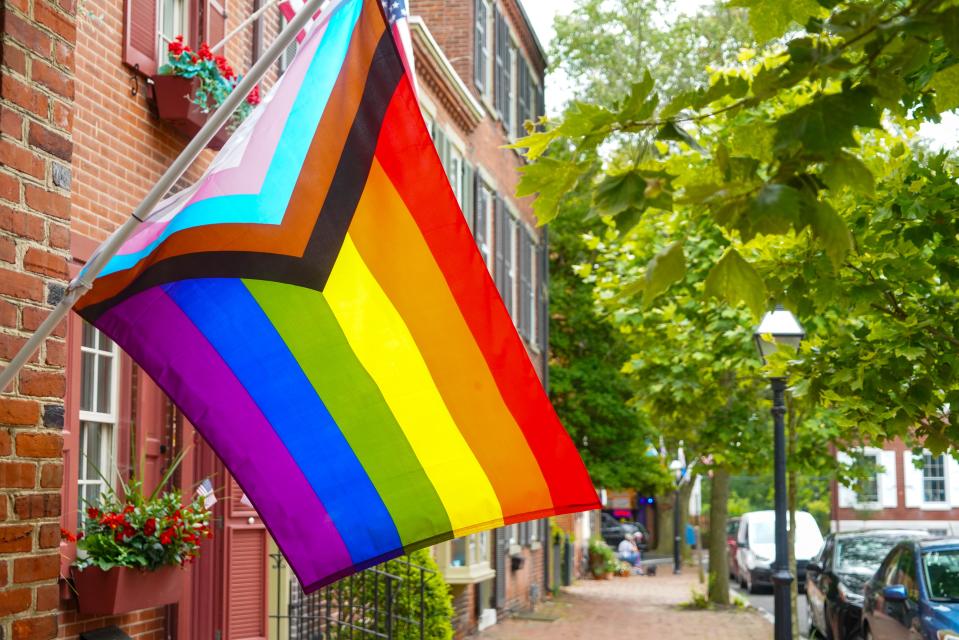
While the changes in the halls of Concord High School are the most tangible product of the GSA’s efforts, “the movement,” as Consiglio calls it, changed club members, too.
“They've developed a tremendous sense of empowerment. Like, they know they can make change,” he said. “I watched them grow so much in resilience, in confidence, in compassion.”
Consiglio recalls a meeting where current GSA members welcomed the ninth graders who joined this year and emphasized the urgency of the work they do, telling the underclassmen, “You guys need to understand who we are and what we’ve done because this is yours now to carry forward.”
Or when Gloner implored new club members to remain respectful to everyone, even those who don’t respect them, “because it's the only way to get things done.” Afterward, the adviser gave Gloner a hug and told him how proud of him he was, he fondly remembers.
After last year’s story about Choose Maroon ran and University of Delaware professor Jane Case caught wind of it, she invited Hevalow and another GSA member to share their story in her leadership class, already cementing their status as trailblazers.
“High school’s tough enough, but I also think that, when the change is earned, it’s just so much more real,” Consiglio said. “Because they actually wanted to change something, they had to learn how to do it. And once they’ve learned how to do it, now they’ve got it for life.”
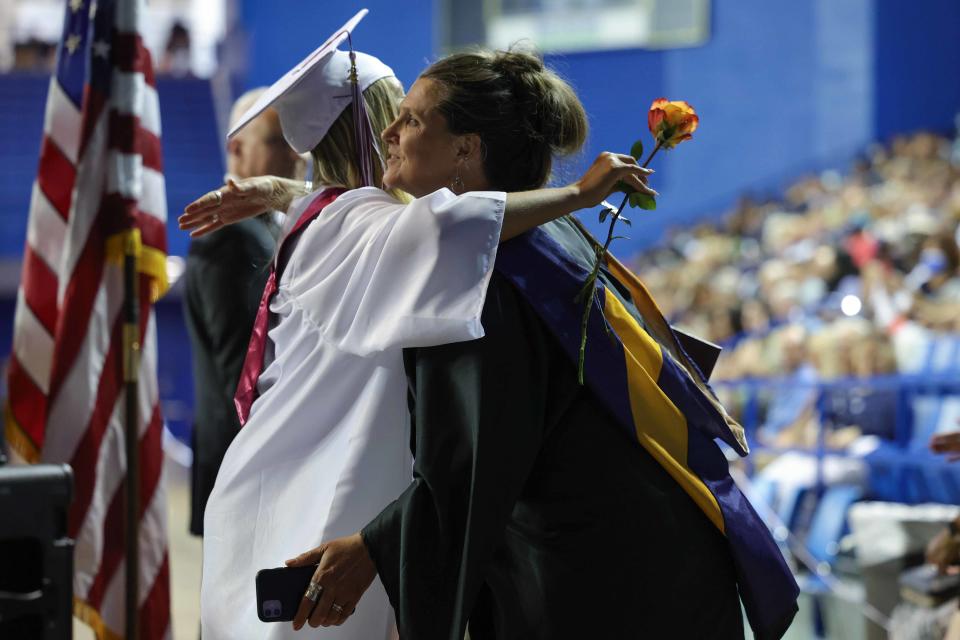
Consiglio has also noticed more students coming to his room for GSA meetings, however involved or uninvolved they wish to be, because they recognize it as a safe space to be themselves and be among like-minded peers.
Hevalow, who usually describes herself as “more of a listener than a speaker,” said the GSA proved to be a great opportunity to hear new perspectives and become more open-minded about others’ life experiences and identities while educating others, something she sees as a crucial and formative part of high school when it comes to the developing minds of youth.
“I think that is probably the most important thing that GSA can do, because a lot of people don’t have that environment,” she said. “And I really think that I was able to at least make a small change in welcoming students who sometimes feel unsafe or unwelcomed because of their gender or sexual orientation.”
Through the club, she has helped raise awareness about Pride Week, which the club annually hosts, and recognize the Day of (No) Silence, an annual day organized by human rights organization GLSEN that spreads awareness about the effects of harassment and bullying of LGBTQ+ youth.
“Educating people about how there’s different gender identities kind of stops the taboo-ness of being slightly different than everyone else and [tells] children that it’s OK to be different,” Hevalow said.
"I think our school is able to make a difference”
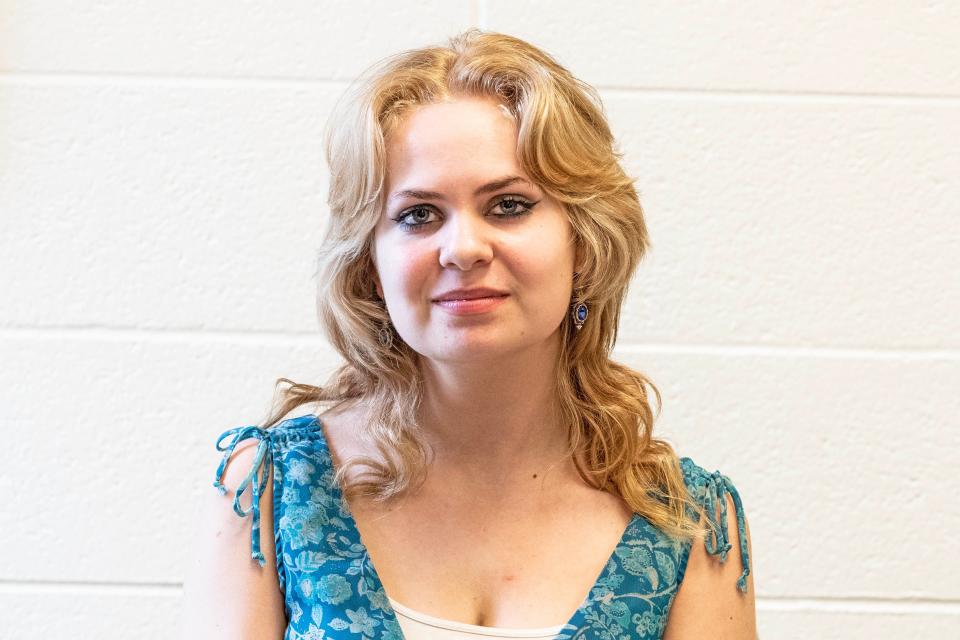
Concord’s GSA has plenty of issues to tackle, but for now, graduation is less of a daunting day than before.
“I mean, I am still a little bit nervous, but I’m at the point in my transition where I just don’t really care. If someone’s going to misgender me, they’re going to misgender me, and I’m just going to look at them like they’re stupid,” Gloner said.
Gloner will cross the stage June 2, turning his tassel and throwing his cap skyward with the rest of the class of 2024. He will look back on his high school experience proud of his efforts fighting for change.
And for the GSA students who have yet to graduate, they’re eager to carry on the torch – a footprint of empowerment, change and inclusion that holds them to the standard not just of being the leaders of tomorrow, but the changemakers of today.
“It’s just so great because, I remember them as ninth graders coming in, going like, ‘Yeah, everything sucks, people are mean,’” Consiglio joked. “Now, they’re coming in going like, ‘This is how you change things. This is what you need to do. This is your legacy,’ so I’m just so proud of them.”
Hevalow approaches a senior year filled with lasts and her upcoming reign as one of the GSA’s three newly elected leaders, a triumvirate for inclusivity.
“I do have hope still because things like these really start out from the grassroots, and I think our school is able to make a difference, hopefully,” she said. The more that we talk about it ... the more that they will think about it.
"And that’s something at least.”
Got a tip or a story idea? Contact Krys'tal Griffin at [email protected].
This article originally appeared on Delaware News Journal: Concord HS GSA continues fights for LGBTQ+ students. What's next
